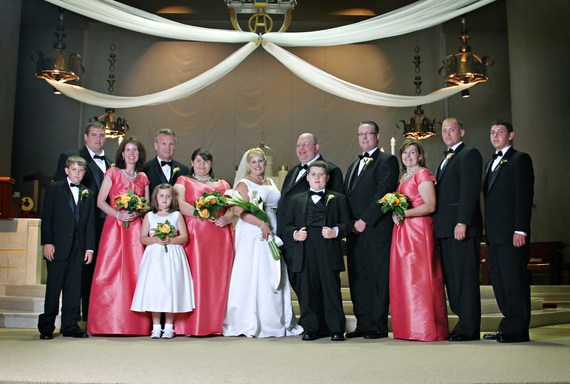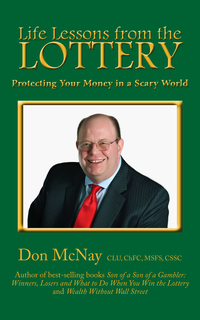"Gonna take your mama out all night
Yeah we'll show her what it's all about"
- Scissor Sisters
When the Supreme Court declared a section of the Defense of Marriage Act (commonly referred to as DOMA) unconstitutional, the issue of same sex marriage has normally been looked at through a political, social and moral lens.
When you get to the bottom line, it is about the bottom line: tax law.
The Supreme Court decision was a challenge by a same sex spouse concerning estate taxes on her inheritance. Over 200 sections of the Internal Revenue Code reference marriage in some fashion. Some are obvious, such as filing tax returns as a married couple instead of a single person. Some are less obvious, like how much a married couple can contribute to a retirement plan as opposed to a single person.
Items such as social security benefits, retirement benefits, health care and workers compensation benefits are all very different for a married couple. A same sex couple who has been receiving employment benefits while in a domestic partnership may suddenly find after marriage that their economic status does not really change, but their tax bracket does.
All Americans are created equal in that they are expected to pay income taxes. What the Supreme Court did was to allow married same sex couples to file a joint tax return. Although there are social and civil issues tied to the decision, United States v. Windsor was an estate tax case and where we will see the biggest economic change is when same sex couples go to file their income taxes.
Looking strictly from an economic viewpoint, is it a good idea for a same sex couple to get married?
Love and Money
What's love got to do with it?
- Tina Turner
The first step that all seriously committed couples, same sex or heterosexual, should do is find a competent financial planner to help them plot out a well thought out strategy. A study by Kansas State University researcher Sonya Britt said arguing about money is the top predictor of divorce.
According to a survey by the National Fatherhood Institute, finances are the number two cause of divorce behind lack of communications. Sex is far down the list. People will talk about sex more quickly than they will talk about their finances. I've been helping people with their money for 33 years. I've had at least 100 occasions where one spouse will say something during our meeting that the other spouse was unaware of.
Sometimes I feel like I have traveled back in time and am reliving Bob Eubank's role as host of The Newlywed Game. Spouses often keep the topic of money off limits. Thus, they don't truly know what the other spouse is thinking. The lack of communications about finances becomes a recipe for relationship disaster. Couples hit the top two targets for divorce in one swoop.
In the world of same sex couples, it's even more vital that they understand the financial opportunities and steps they need to go through. They are coming into a new world from a tax and financial standpoint and being hit with a number of provisions in the tax world that are unique to their situation.
On the other hand, same sex couples are no different than anyone else. When my wife and I decided to get married, we faced the ultimate Tina Turner question: "What's love got to do with it?" The answer is everything.
That's normally the answer for every other married couple I have ever met.
It wasn't a financial decision. In fact, in a world of children, step-children, grandchildren and houses in different cities, love is the only thing that would allow people to overcome the financial hurdles that marriage can have.
Couples want to have the love, commitment and connection that marriage brings. There are some couples who approach life in a systematic, rational manner devoid of emotion. A little like Mr. Spock on Star Trek.
Note that Mr. Spock was from another planet. For good reason. Most Americans make decisions based on emotion, impulse and what feels good at the moment. That is why we have upside down car payments, maxed out credit cards and houses we can't afford.
I'm not asking couples to give up romance and emotion. I'm asking them to think about their finances, just a little bit, before they tie the knot, no matter what their sexual preference .
Two of my friends had a novel idea. They invited me to dinner and told me that walking them through their premarital finances would be my wedding present to them. It would have been simpler to have picked out some Waterford Crystal, but I took on the challenge and over dinner, got them to address some major issues, like setting up a will and who paid for what household expenses. So far, they seem happy and at least have a basic plan.
If nothing else, people need to go through some "what if" scenarios. What if one person dies? What if one person gets sick? What if one of them wins the lottery? What happens if they have or adopt children? What happens if a stepchild from a previous marriage wants to live with them?
Having the basics of a well thought plan will keep a lot of happy marriages happy when these life events pop up. If they pop up and there is a lack of communication or a lack of agreement has to how to handle the situation, you can reference back to the survey on why lack of communications and finances are the major causes of divorce. A little bit of communications can go a long way.
Since the odds of winning a major lottery are about 171 million to one, it does seem like an urgent matter to set up a contingency plan for that topic but many people do. As I note in my bestseller, Life Lessons from The Lottery: Protecting Your Money in a Scary World, the same issues that come up for lottery winners come up when one spouse inherits money or gets a large sum from their employment or in a career as an athlete or entertainer.
More than seventy percent of people who receive an inheritance run through the money in five years or less. It helps to have a plan. The irony is that in the case of Windsor versus United States, the reason that it became a Supreme Court decision was the Internal Revenue Service had a different interpretation of the taxes owed on a planned estate plan. It's possible that an estate planning attorney could have, and should have, anticipated some of the tax issues that Windsor had to go through but if they had, we would not have had the landmark Supreme Court decision.
In New Orleans, people have a "hurricane bag" and plan a route out of town even though this month marks the ninth year since Hurricane Katrina hit the city.
People need a mental "hurricane bag" when it comes to their finances.
I've written extensively about what to do when you win the lottery and work with people who get large sums of money. I can sum up the "what happens when you win the lottery" question in one paragraph.
If you win the lottery and you are married, your spouse gets half. If you are separated but never got around to getting divorced (or your divorce is not final), your spouse still gets half. If you are not married, living together and one person wins the lottery, the partner with the winning ticket gets everything and the other gets zero. If you are living together, win the lottery and want to give your partner a chunk when you die, they will probably wind up paying estate taxes on it. If you are married, you can pass an unlimited amount to your spouse.
It gets a little more complicated, but if you win the lottery I tell people to do is find some experts who work with that kind of money. You'll save the money spent on good advisors thousands of times over.
Moral versus Legal
"Baby I'm only society's child"
- Janis Ian
United States v. Windsor was about estate tax planning. Edith Windsor and Thea Spyer were a same sex couple married in Canada in 2007 after 40 years of romantic partnership, but lived in New York. When Spyer died in 2009, she left her estate to Windsor, but the federal government did not recognize the marriage and claimed that Windsor owed $363,053 in estate taxes. Once the marriage was recognized she owed nothing.
The key legal issue was recognizing that a marriage performed elsewhere was valid in New York, even if the state did not recognize same sex marriage at the time.
From a tax law standpoint, the domicile issue had been decided a long time ago.
For many people, the issue of same sex marriage is a moral issue. A number of people and churches believe that same sex marriage, or sex by two people of the same sex, is a sin.
There are a number of people and religions opposed to a heterosexual couple sharing the same household or having sex before marriage. The term "living in sin" was a commonly heard expression to describe that belief. Some states recognize a couple living together as a "common law marriage," and those couples have the same rights as legally married couple.
There are some people who think that interracial marriage is a sin or violates their religious beliefs. Seventeen states had laws against interracial marriage in 1967 when the United States Supreme Court, in the case Loving v. Virginia, struck those laws done.
In 1958, the IRS determined (in Revenue Ruling 58-66 1958-1 C.B. 60) that people who were deemed in a common law marriage were considered married in that state. It further went on to note that if a couple had been considered married in a common law state and moved to another state, they were still considered married and eligible to file a joint tax return even if their new state did not recognize common law marriage.
With the Internal Revenue Service's long history with common law marriage, it is easy to see that after the Windsor case the IRS would use that as a precedent to allow same sex couples to follow the same laws.
From a tax law standpoint, it would probably be impossible for the agency to rule any other way. Thus, Revenue Ruling 2013-17 from the Internal Revenue Service says, "For Federal tax purposes, the Internal Revenue Service recognizes a marriage of same-sex individuals validly entered into in a state whose laws authorize the marriage of two individuals of the same sex, even if the state in which they are domiciled does not recognize the validity of same-sex marriages."
What that means is that if a same sex couple gets married in Vermont, where the legislature has legalized same sex marriage, and moves to Alabama, which currently bans same sex marriage by constitutional amendment and state law, they are legally married for income tax purposes.
The only "sin" that the Internal Revenue Service is interested in is one where you don't pay your taxes.
I'm not a lawyer, but from reading the revenue ruling, the safest thing that a same sex couple can do is to get married in a state whose legislature has ratified same sex marriage and then live in whatever state they want. That would absolutely be complying with the IRS Revenue Ruling. The courts are frequently ruling against laws outlawing same sex marriage, state by state, but until all the dust has settled, there could be a few complications along the way. As I told a same sex couple recently, Hawaii is a great place to get a marriage license and have a honeymoon. They can have the marriage ceremony when, where and how they want.
Death and Taxes
"Is this the real life?
Is this just fantasy?
Caught in a landslide
No escape from reality"
-Queen http://www.rollingstone.com/music/videos/flashback-queen-steal-the-show-at-live-aid-20130205
The reality is that people are going to continue to pay taxes. How much they pay, how they file their return and how they take advantage of opportunities and tax incentives are situations where a little bit of planning can go a long way.
The Supreme Court decision and the IRS Revenue Ruling are very clear in stating that a same sex couple who are married in a location that recognizes same sex marriage are a couple for tax purposes in all 50 states. With 200 references to marriage in the tax code (and the unique opportunity for same sex couples to amend tax returns from previous years to reflect their new status), same sex couples need to spend some time understanding their new status in the tax code.
Paying taxes is not a moral issue; it is a legal one. If you are morally opposed to paying taxes, it is a good idea to find another country as the federal government will lock you up in prison for a very long time. It's not illegal to look for tax deductions and most tax deductions are incentives for certain behaviors. A tax deduction for mortgage interest encourages home ownership. A tax deduction for retirement planning allows people to develop some long-term savings.
(I suspect that the tax breaks for Wall Street, such as the wave of "inversions" where big companies can buy twenty percent of a foreign company and then "move" their company to their new headquarters (you can read my thoughts in a previous Huffington Post column) are an incentive for Wall Street to keep sending campaign contributions and high powered lobbyists to Washington but I digress.)
In Life Lessons from the Lottery: Protecting Your Money in a Scary World, I tell people to find good advisors, get rich slowly, take your money over time and give back to society.
It's good advice for all people, married or unmarried.
Don McNay, CLU, ChFC, MSFS, CSSC is the founder of McNay Consulting, www.mcnayconsulting.com, in Richmond Kentucky and the best-selling author of several books including Life Lessons from the Lottery Protecting Your Money in a Scary World http://www.amazon.com/Life-Lessons-Lottery-Protecting-Money-ebook/dp/B00A5WUOMW and Wealth Without Wall Street.http://www.amazon.com/Wealth-Without-Wall-Street-Making-ebook/dp/B005IDKWR0



